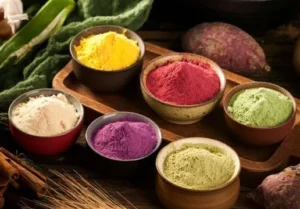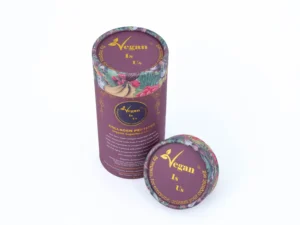Understanding Vitamin K: An Essential Nutrient for Health and Wellness
Vitamin K is a fat-soluble vitamin that plays a vital role in various physiological processes, particularly in promoting bone and heart health. It exists in two primary forms: Vitamin K1 (phylloquinone) and Vitamin K2 (menaquinone). While both forms are crucial for overall health, they function differently within the body. This article will explore the distinct roles of Vitamin K1 and K2, their sources, benefits, recommended intake, and the importance of incorporating them into a plant-based diet.
What is Vitamin K?
Vitamin K refers to a group of fat-soluble vitamins required by the body to produce prothrombin, a protein essential for blood clotting and bone metabolism. There are two main types of Vitamin K:
- Vitamin K1 (phylloquinone): Found primarily in leafy green vegetables, Vitamin K1 is the most common form consumed through the diet.
- Vitamin K2 (menaquinone): Present in fermented foods, animal proteins, and produced by gut bacteria, Vitamin K2 has a broader range of functions in the body.
Functions of Vitamin K
Vitamin K plays key roles in various bodily functions:
- Blood Clotting: Both Vitamin K1 and K2 are crucial for the production of prothrombin, a protein involved in blood coagulation. This function is most closely associated with Vitamin K1, which plays a primary role in blood clotting.
- Bone Health: Vitamin K2 is vital for bone metabolism by activating osteocalcin, a protein that binds calcium to bones, promoting bone mineralisation and density.
- Heart Health: Vitamin K2 may help protect against cardiovascular disease by activating proteins that prevent calcium from accumulating in the arteries, reducing the risk of arterial stiffness and heart damage.
Additionally, Vitamin K has antioxidant properties that protect cells from damage caused by free radicals. Some studies suggest that adequate levels of Vitamin K2 may reduce the risk of certain cancers and support brain health by regulating blood glucose levels, which may help alleviate symptoms of depression and anxiety.
Vitamin K1 vs. Vitamin K2: Key Differences
While both forms of Vitamin K are essential for health, they differ in their chemical structure and roles within the body:
- Vitamin K1: The primary dietary form of Vitamin K, found in green vegetables, is mainly involved in blood coagulation. However, it is less efficiently absorbed by the body compared to Vitamin K2.
- Vitamin K2: This form is absorbed more efficiently by the body and is found in fermented foods and animal products. It has several subtypes (MK4 through MK13), each with different functions, including supporting bone health and reducing the risk of cardiovascular disease.
Research has shown that the body absorbs Vitamin K2, particularly the MK7 subtype, up to 10 times more effectively than Vitamin K1. Those on a plant-based diet should ensure they get adequate Vitamin K2 from plant-based sources or supplements.
Plant-Based Sources of Vitamin K
While Vitamin K1 is abundant in many plant foods, Vitamin K2 is harder to obtain from a plant-based diet. However, there are several excellent sources of both forms of Vitamin K within a plant-based diet:
Sources of Vitamin K1 (primarily from plant foods):
- Leafy green vegetables such as spinach, kale, collard greens, and Swiss chard
- Cruciferous vegetables like broccoli and Brussels sprouts
- Herbs such as parsley and basil
- Vegetable oils like soybean oil, canola oil, and olive oil
- Fruits like blueberries and grapes
- Certain fruits such as avocados and kiwis
Sources of Vitamin K2 (plant-based options):
- Fermented foods: Fermentation is one of the best ways to obtain Vitamin K2, particularly the MK7 subtype. Examples include:
- Natto: A traditional Japanese dish made from fermented soybeans, Natto is the richest source of MK7, the most bioavailable form of Vitamin K2.
- Sauerkraut: Fermented cabbage that provides modest amounts of Vitamin K2.
- Kimchi: Another fermented vegetable dish that offers some Vitamin K2.
- Miso: A fermented soy paste contributing to Vitamin K2 intake.
- Shiitake mushrooms: These provide small amounts of Vitamin K2, especially when dried.
- Plant-based dairy alternatives: Certain fermented plant-based cheeses made from nuts or soy may contain small amounts of Vitamin K2.
For those following a plant-based diet, these fermented foods can be excellent sources of Vitamin K2.
Health Benefits of Vitamin K2
Vitamin K2 offers numerous health benefits, especially in the following areas:
- Heart Health: Vitamin K2 activates Matrix Gla Protein (MGP), which prevents calcium from accumulating in blood vessels, reducing the risk of arterial calcification and coronary heart disease. Regular consumption of Vitamin K2 has been linked to improved cardiovascular health.
- Bone Health: By activating osteocalcin, Vitamin K2 helps bind calcium to bones, supporting healthy bone density. Studies show that Vitamin K2 supplementation can improve bone mineralisation, particularly in postmenopausal women at risk of osteoporosis.
- Mental Health: Research suggests that Vitamin K2 may help regulate blood glucose levels, reducing symptoms of anxiety and depression, and overall promoting mental well-being by reducing oxidative stress.
- Cancer Prevention: Vitamin K2’s antioxidant properties may help protect against certain cancers by inhibiting tumour growth and reducing inflammation.
- Regulating Blood Sugar: Vitamin K2 may improve insulin sensitivity and assist in regulating blood sugar levels, benefiting those with metabolic syndrome or type 2 diabetes.
Recommended Daily Intake and Deficiency
The recommended daily intake of Vitamin K varies by age and gender:
- Adult males: 120 mcg
- Adult females: 90 mcg
While Vitamin K1 deficiencies are rare, individuals at risk include those with gastrointestinal disorders, such as celiac disease or inflammatory bowel disease (IBD), and newborns. A deficiency can lead to blood clotting issues and weakened bone health. Vitamin K2 deficiency, although rare, can occur in individuals with limited fermented food intake. Ensuring adequate intake of both forms of Vitamin K is essential for overall health.
Vitamin K2 Deficiency: Are You at Risk?
Vitamin K2 deficiency is rare but may occur in those with poor gut health or conditions affecting nutrient absorption, such as celiac disease, ulcerative colitis, or long-term antibiotic use. Symptoms of deficiency include:
- Increased bruising or bleeding
- Weakened bones (osteoporosis)
- Calcification of arteries
For those at risk, including plant-based eaters who may not consume enough fermented foods or animal products, supplementing with Vitamin K2 may be beneficial.
Should You Take a Vitamin K2 Supplement?
Although most people get enough Vitamin K1 from their diet, Vitamin K2 can be harder to obtain, especially for those not consuming fermented foods or animal products. Supplementing with Vitamin K2 can help ensure adequate intake to support bone and heart health, particularly for:
- Vegans and vegetarians avoiding fermented soy products or animal-based foods
- Older adults at risk of osteoporosis and heart disease
- Individuals with heart health concerns aiming to improve vascular health
Types of Vitamin K2 Supplements:
- MK4: A shorter-lasting form, beneficial for bone health.
- MK7: A longer-lasting form, ideal for both bone and heart health.
Always consult with a healthcare provider before starting any supplement, particularly if you are on blood thinners like warfarin, as Vitamin K2 can interfere with these medications.
Key Takeaways
Vitamin K, including both K1 and K2, is an essential nutrient that supports vital functions such as blood clotting, bone health, and heart function. While Vitamin K1 is abundant in leafy greens and other plant foods, Vitamin K2 is primarily found in fermented foods and animal products. Plant-based individuals can achieve adequate intake of Vitamin K2 by consuming fermented plant-based foods such as natto, kimchi, and miso. Vitamin K2 is a powerful nutrient that supports far more than just blood clotting. From maintaining strong bones to supporting heart health and mental well-being, Vitamin K2 plays a crucial role in overall health. For those following a plant-based lifestyle, it’s important to ensure sufficient intake of Vitamin K2 through fermented foods like natto, miso, and kimchi, or through supplementation.
Whether you want to protect your heart, enhance bone density, or improve your overall health, Vitamin K2 is an essential nutrient worth prioritising. Start incorporating K2-rich foods into your diet today and take the first step towards better health. Visit our blog to learn more about plant-based living can support your wellness naturally.







